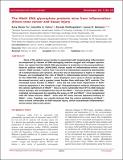The Mbd4 DNA glycosylase protects mice from inflammation-driven colon cancer and tissue injury
Author(s)
Yu, Amy Marie; Calvo, Jennifer A.; Muthupalani, Sureshkumar; Samson, Leona D
DownloadYu-2016-The Mbd4 DNA glycosy.pdf (4.170Mb)
OPEN_ACCESS_POLICY
Open Access Policy
Creative Commons Attribution-Noncommercial-Share Alike
Terms of use
Metadata
Show full item recordAbstract
Much of the global cancer burden is associated with longstanding inflammation accompanied by release of DNA-damaging reactive oxygen and nitrogen species. Here, we report that the Mbd4 DNA glycosylase is protective in the azoxymethane/dextran sodium sulfate (AOM/DSS) mouse model of inflammation-driven colon cancer. Mbd4 excises T and U from T:G and U:G mismatches caused by deamination of 5-methylcytosine and cytosine. Since the rate of deamination is higher in inflamed tissues, we investigated the role of Mbd4 in inflammation-driven tumorigenesis. In the AOM/DSS assay, Mbd4[superscript –/–] mice displayed more severe clinical symptoms, decreased survival, and a greater tumor burden than wild-type (WT) controls. The increased tumor burden in Mbd4[superscript –/–] mice did not arise from impairment of AOM-induced apoptosis in the intestinal crypt. Histopathological analysis indicated that the colonic epithelium of Mbd4[superscript –/–] mice is more vulnerable than WT to DSS-induced tissue damage. We investigated the role of the Mbd4[superscript –/–] immune system in AOM/DSS-mediated carcinogenesis by repeating the assay on WT and Mbd4[superscript –/–] mice transplanted with WT bone marrow. Mbd4[superscript –/–] mice with WT bone marrow behaved similarly to Mbd4[superscript –/–] mice. Together, our results indicate that the colonic epithelium of Mbd4[superscript –/–] mice is more vulnerable to DSS-induced injury, which exacerbates inflammation-driven tissue injury and cancer.
Date issued
2016-04Department
Massachusetts Institute of Technology. Center for Environmental Health Sciences; Massachusetts Institute of Technology. Department of Biological Engineering; Massachusetts Institute of Technology. Department of Biology; Massachusetts Institute of Technology. Division of Comparative Medicine; Koch Institute for Integrative Cancer Research at MITJournal
Oncotarget
Publisher
Impact Journals/National Center for Biotechnology Information (U.S.)
Citation
Yu, Amy Marie, Jennifer A. Calvo, Suresh Muthupalani, and Leona D. Samson. “The Mbd4 DNA Glycosylase Protects Mice from Inflammation-Driven Colon Cancer and Tissue Injury.” Oncotarget (May 9, 2016). © 2016 Impact Journals, LLC
Version: Final published version
ISSN
1949-2553